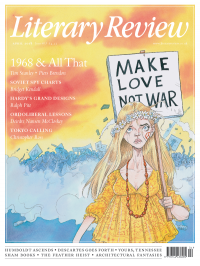Ed Potten
Shelf Indulgence
The use of sham books in England has a long history. In a famous satirical description of ‘Leonora’s library’, published in The Spectator in 1711, Mr Spectator writes of his visit to the ‘Lady’s Library’ of a widow named Leonora, ‘formerly a celebrated beauty’ who has subsequently ‘turned all the passions of her sex into a love of books’. There he found a number of ‘counterfeit books upon the upper shelves, which were carved in wood, and served only to fill up the number, like fagots in the muster of a regiment’. For this practice to be satirised, it seems likely to have already been well established by 1711.
The early years of the 18th century saw dramatic changes in the content, use and architecture of the private library. With a few notable exceptions, most early 17th-century private libraries in Britain were ‘closet’ libraries, small collections of practical books kept in a locked chest or a closet off a bedchamber. As such, they were wholly private spaces for study, devotion and contemplation. With the increase in printed output in the 16th and 17th centuries, books became more affordable and widely accessible, and libraries began to outgrow

Sign Up to our newsletter
Receive free articles, highlights from the archive, news, details of prizes, and much more.@Lit_Review
Follow Literary Review on Twitter
Twitter Feed
In fact, anyone handwringing about the current state of children's fiction can look at over 20 years' worth of my children's book round-ups for @Lit_Review, all FREE to view, where you will find many gems
Literary Review - For People Who Devour Books
Book reviews by Philip Womack
literaryreview.co.uk
Juggling balls, dead birds, lottery tickets, hypochondriac journalists. All the makings of an excellent collection. Loved Camille Bordas’s One Sun Only in the latest @Lit_Review
Natalie Perman - Normal People
Natalie Perman: Normal People - One Sun Only by Camille Bordas
literaryreview.co.uk
Despite adopting a pseudonym, George Sand lived much of her life in public view.
Lucasta Miller asks whether Sand’s fame has obscured her work.
Lucasta Miller - Life, Work & Adoration
Lucasta Miller: Life, Work & Adoration - Becoming George: The Invention of George Sand by Fiona Sampson
literaryreview.co.uk